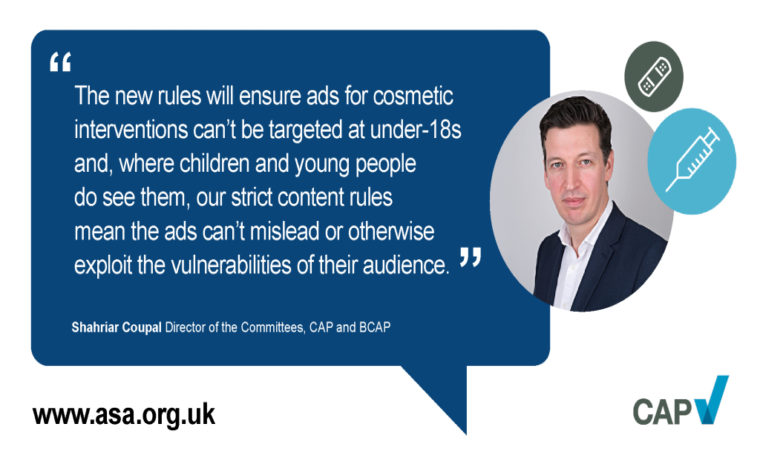
Following a public consultation last year, the Committee of Advertising Practice (CAP) and Broadcast Committee of Advertising Practice (BCAP) are introducing new targeting restrictions that prohibit cosmetic interventions advertising from being directed at under-18s.
The new targeting restrictions will come into effect on 25 May 2022 and essentially require that:
- Ads for cosmetic interventions must not appear in non-broadcast media directed at under-18s;
- Ads for cosmetic interventions must not appear in other non-broadcast media where under-18s make up over 25% of the audience; and
- Broadcast ads for cosmetic interventions must not appear during or adjacent to programmes commissioned for, principally directed at or likely to appeal particularly to under-18s.
CAP and BCAP will conduct a 12-month post-implementation review to ensure that the new rules are functioning as intended.
Children and young people are particularly vulnerable to body image pressures and negative body image perceptions are prevalent amongst those groups, which can have an impact on their self-esteem, wellbeing, mental health and behaviours. In particular, the period of adolescence has been highlighted in the evidence cited by consultation respondents as a life stage in which children and young people’s body image positivity may rapidly decline.
Children and young people’s body image perceptions and their susceptibility to pressures to change their appearance, including considering cosmetic interventions as a potential means to address those concerns, are influenced by a number of social and cultural factors. Nevertheless, the evidence shows there is potential that exposure to different forms of media including advertising, particularly those that focus on body image ‘improvements’ such as cosmetic intervention procedures, is likely to exacerbate body image dissatisfaction and negativity during vulnerable stages of their lives.
CAP and BCAP recognise that individuals undergo cosmetic interventions for a variety of reasons and that the majority of cosmetic interventions are legally available to under-18s, some of which are subject to legal requirements relating to capacity to consent.
Notwithstanding, taking into account the inherent risks of cosmetic interventions and the potential harms to children and young people arising from exposure to advertising of these treatments and procedures, CAP and BCAP consider that there is a persuasive case for implementing the age-based targeting restrictions for cosmetic interventions advertising. CAP and BCAP consider that the new targeting restrictions would help appropriately limit children and young people’s exposure to cosmetic interventions advertising, and play a part in mitigating the potential wider body image related harms experienced by those age groups.
To assist advertisers in understanding how to comply with the new restrictions, the Advertising Guidance on Cosmetic Interventions has been revised to reflect the new rules and clarify the types of treatments and procedures that are likely to fall within the scope of “cosmetic interventions” to which the new restrictions would apply.
For more information, please refer to CAP and BCAP’s Regulatory Statement, Evaluation of Consultation Responses and the updated Advertising Guidance on cosmetic interventions marketing.
More on
-
Keep up to date
Sign up to our rulings, newsletters and emargoed access for Press. Subscribe now.


